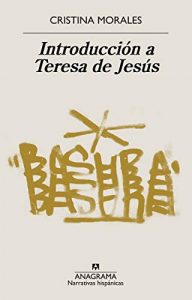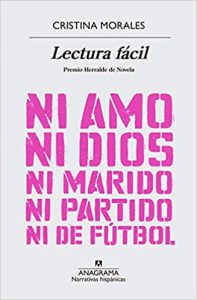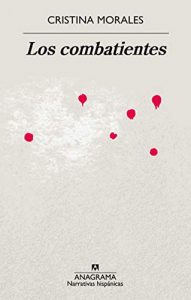Single verse of any labeling that you want to impose, Cristina Morales placeholder image is a writer who captivates all types of readers with a risky, direct, ingenious, acidic, vindictive narrative ... so many qualifiers that it escapes from the unhealthy intention of the pigeonhole that, in any case, could be adjusted to a mix between the ideological of Marx and the humanistic of Houellebecq.
With the maturity of the writer discovered herself at the age in which the one who writes the most is to put black on white in a diary, Cristina abounds in that universe already recognized in part during the pristine expeditions of youth. A vast territory that is rediscovered inland.
With such a base, the diffuse outline of the literature made vindication marks an evident path in Cristina Morales that will never be an exception in literature. A thread to pull on which, curiously enough, other current writers also lavish themselves. Cases like those of Bethlehem Gopegui o Edurne portela. All of them made sensitivity towards the awakening of consciousness in its most existential revision or in its most sociological aspect.
Seen however you want to see it, the point is that any book by Cristina Morales is that critical vision of what we are and what we do. A summary judgment where each paragraph tears apart the arguments in defense of our world. Stories that, therefore, move and disturb; necessary arguments as narrative surplus value.
Top 3 recommended novels by Cristina Morales
Introduction to Teresa of Jesus
Perhaps Teresa of Jesús had too much faith in that positive side of humanity. In any case, she would never show a bad gesture or disdain towards anyone who approached her with the evil intention of improving her image or redeeming her due to proximity of any sin.
This book is the supposed writing of that last truth of a soul given to the impossible mission of the faith in the human thing; of the example as a possible beginning of the way to salvation.
It runs in 1562 and Teresa de Jesús, at age forty-seven, is staying at the Luisa de la Cerda palace in Toledo. She consoles her hostess for the melancholy caused by the death of her husband, waits for the foundation of her new convent to prosper and dedicates herself to writing a text destined to become a decisive work in the birth of the autobiographical genre. The book of life, that he will have to please his ecclesiastical superiors and defend it against his detractors.
But ... what if the saint had written another manuscript in parallel, a more intimate diary, not intended to please or defend her before anyone, but to evoke her past life and try to explain herself as a human being?
That is what Cristina Morales imagines, giving voice to a Teresa, if not free from ties and commitments, then aware of them and fighting against them. A Teresa who searches her memories and explores herself in her writing: she evokes her childhood with games of Romans and martyrs, the sufferings and humiliations of her mother in her multiple pregnancies, her life between discipline and rebellion, her destiny as a woman in a society designed by and for men ...
«My God, should I write that in my youth I was mean and vain and that now God rewards me? Should I write to please the father confessor, to please the great scholars, to please the Inquisition or to please myself? Should I write that I do not embrace any reform? Should I write because it was sent to me and I have taken a vow of obedience? My God, should I write?
The result is the suggestive reinvention of an essential figure in universal literature, written from the freedom and radicalism that Teresa de Jesús herself represented.
Easy reading
There are four: Nati, Patri, Marga and Àngels. They are related, have varying degrees of what the Administration and medicine consider "intellectual disability" and share a tutored floor. They have spent a good part of their lives in RUDIS and CRUDIS (urban and rural residences for people with intellectual disabilities). But above all, they are women with an extraordinary capacity to face the conditions of domination that they have suffered. His is the oppressive and bastard Barcelona: the city of squats, the Platform for People Affected by Mortgages, anarchist athenaeums and politically correct art.
This is a radical novel in its ideas, in its form, and in its language. A cry-novel, a politicizing novel that crosses voices and texts: a fanzine that puts the neoliberal system in check, the minutes of a libertarian assembly, the statements before a court that intends to forcibly sterilize one of the protagonists, the autobiographical novel that write one of them with the Easy Reading technique ...
This book is a battlefield: against white, monogamous hetero patriarchy, against institutional and capitalist rhetoric, against activism that uses the garb of "the alternative" to prop up the status quo. But it is also a novel that celebrates the body and sexuality, the desire of and among women, the dignity of those who are marked with the stigma of disability, and the transgressive and revolutionary capacity of language. It is above all a portrait –visceral, vibrant, combative and feminist– of contemporary society with the city of Barcelona as a setting.
Easy reading confirms Cristina Morales as one of the most powerful, creative, nonconformist and innovative voices in current Spanish literature.
The fighters
The first film in terms of the author's novel. One of those stories in which the narrative will emerges as something sequential from the ideological point of view. Neither good nor bad, simply total openness, frankness and proselytism for their cause from a narrative that rescues from the most real the vision of a world where art necessarily becomes a vindication by abandoning the functions of all social initiative.
This is about a rabid youth floating among the wreck; of a group of theater actors who become political actors and decide that reality can only be portrayed through ridicule, and that this, to be credible and effective, must start with oneself and reach our literary masters.
Who are the combatants: those who jump rope (like boxers in their training sessions), members of a university theater company, young people who in s. XXI survive by gorging on love since they cannot get enough of bread, in the words of the sociologist Layla Martínez.
This is a book - perhaps a novel, perhaps a play - that tells a true story through fiction, which speaks of representation and reality, of imposed radicalisms and authentic transgression, of art as provocation and provocation as art It does so by challenging the reader (and also the reader) in a far from innocent game that incorporates, sometimes quoting and sometimes without quoting, other people's texts.



